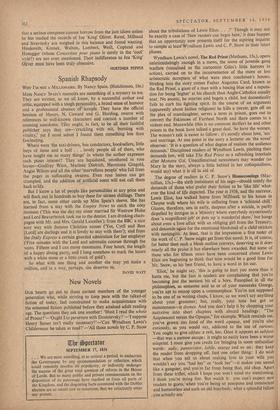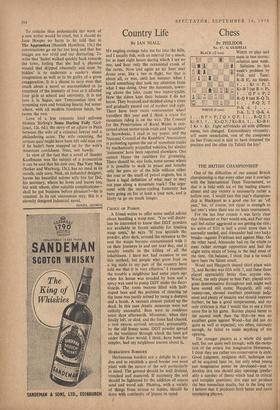New Novels
OUR hearts go out to those earnest members of the younger generation who, while striving to keep pace with the talked-of fiction of today, feel constrained to make acquaintance with the esteemed fiction published before they attained adult reading age. The questions they ask one another! 'Must I read the whole of Proust?'—'Ought Ito persevere with Dostoievsky?'—`I suppose Henry James isn't really necessary?'—`Can Wyndham Lewis's Childermass be taken as read?'—`All those novels by C. P. Snow about the tribulations of Lewis Eliot. . . .?' Though it may not be exactly a case of 'New readers can begin here,' it does happen that an opportunity now presents itself for the aspiring inquirer to sample at least Wyndham Lewis and C. P. Snow in their latest phases. '
Wyndham Lewis's novel, The Red Priest (Methuen, 15s.), opens unintimidatingly enough in a mews, the scene of juvenile gang warfare (visualised as the cartoonist Giles's little horrors in action), carried on to the inconvenience of the more or less aristocratic occupiers of what were once coachmen's houses. Striding into the story comes Father Augustus Card, known as the Red Priest, a giant of a man with a boxing blue and a reputa- tion for being 'higher' at his church than Anglo-Catholics usually soar. No ascetic, he marries and begets a child, but domestically fails to curb his fighting spirit. In the course of an argument (apparently about Indian religions) he kills a curate, gets off on the plea, of manslaughter, serves a term in prison, goes out to convert the Eskimoes of Farthest North and there comes to a violent end. Meanwhile (this is no common thriller) he and other priests in the book have talked a great deal. So have the women. The women's talk is easier to follow : it's mostly about love, 'sex' and marriage. At one point in the story a lecturer on 'the novel' observes: 'It is a question of what degree of realism the audience demands.' Disciplined readers of Wyndham Lewis, pitching their demands low, will take The Red Priest as a refreshing interlude after Monstre Gai. Unacclimatised newcomers may wonder (as Mary in the story, always a little behind in her colloquialisms, would say) what it is all in aid of.
The degree of realism in C. P. Snow's Homecomings (Mac- millan, 15s.)—the sixth instalment of his saga—should satisfy the demands of those who prefer their fiction to be 'like life' what- ever the kind of life depicted. The year is 1938, and the narrator, Lewis Eliot, has walked home from Millbank to his house in Cheyne walk where his wife is suffering from a 'schizoid chill.' Gloom, therefore, sets in early, deepens after a suicide, is partly dispelled by intrigue in a Ministry where everybody mysteriously does 'a magnificent job' or puts up 'a wonderful show,' but hangs about even a love affair with an obliging girl from the Treasury, and descends again for the emotional blackmail of a child stricken with meningitis. At least, that is the impression a first taster of the work of C. P. Snow might get from this novel. It is, of course, far better than such a bleak outline conveys, deserving as it does nearly all the praise it has elsewhere been awarded. But some of those who for fifteen years have been concerned about Lewis Eliot are beginning to think that now would be a good time for Mr. Snow, as his best friend, to have a word in his ear.
'Eliot,' he might say, 'this is going to hurt you more than it hurts me, but the fact is readers are complaining that you're becoming just the teeniest bit of a bore. Panoplied in all the philosophies, as someone said to or of your namesake George, you're apt to swoop upon a commonplace. You're not supposed to be one of us writing chaps, I know, so we won't say anything about your grammar; but, really, your tone has got so monotonous—it drones. And you don't help it by chopping your narrative into short chapters with absurd headings: "The Acquiescent versus the Opaque," for example. Which reminds me, you've grown too fond of the word opaque, and you're also curiously, as you would say, addicted to the use of curious. You ought to give obf usc a rest, too. Once it appears as subf use —that was a narrow escape: it might so easily have been a worse misprint. I must give you credit for bringing in some unfamiliar words: sadly, pantocrator, labile, snurge and so on: they keep the reader from dropping off. Just one other thing : I do wish that when you tell us about making love to your wife you wouldn't say you "had her" or "took her"—it makes you sound like a gangster, and you're far from being that, old chap. Apart from these trifles, which I hope you won't mind my mentioning. I think you're doing line. But watch it : you can't expect new readers to guess, when you're being so pompous and omniscient and humourless and such an old busybody, what a splendid fellow you actually are.'
To criticise thus pedantically the work of a new writer would be cruel, but it should do June Hooper no harm to be told that in The Apprentices (Hamish Hamilton, 15s.) the conversations go on far too long and that her images are too vivid and too distracting. To write that Isabel walked quickly back towards the town, feeling that she had a physical wound that dripped obscenely and must be hidden' is to underrate a reader's visual imagination as well as to be guilty of a gross exaggeration. It is a shame to carp even that much about a novel so accomplished in its treatment of the intensity of love as it affected four girls at school and university. It is not love a la Sagan, nor Tennysonian love of streaming eyes and breaking hearts, but some- where, with all modern freedoms taken, be- tween the two.
Love of a less romantic kind enlivens Monica Stirling's Some Darling Folly (Gol- lancz, 12s. 6d.), the story of an allaire in Paris between the wife of a criminal lawyer and a philandering actor. The wife repenting, the tertium quid might have been left odd man out if he hadn't been snapped up by the wife's American confidante. Neat, not bawdy.
In view of the fact that a novel of Stanley Kauffmann was the subject of a prosecution it can be said that his new one, The Very Man (Seeker and Warburg, 15s.), has no meal in its mouth, only corn. Nick, an industrial designer, leaves his beautiful actress wife Iris for Del, his secretary, whom he loves and leaves too, but with whom, after suitable complications— shall he put business before pleasure?—he is reunited. In its not uncommon way, this is a cleverly designed industrial novel.
DANIEL GEORGE



































 Previous page
Previous page